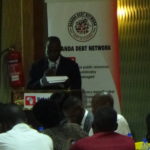The Minister of Finance Matia Kasaija who read Shs40.4 trillion budget last Thursday has said Uganda may not be able to achieve middle income status by 2020 as government had earlier announced.
“We wanted to turn this country into a middle income economy by 2020 but that may not be possible,” Kasaija said at National Budget breakfast in Kampala.
According to the World Bank, middle-income countries are nations with annual per-capita gross national income ranging between USD 1,025 and USD12, 615.
Uganda’s Nominal GDP Per capita is forecasted to be 759.066 USD in Dec 2019 as reported by International Monetary Fund – World Economic Outlook. It records an increase from the last reported number of 724.371 USD in Dec 2018. Looking ahead, Uganda’s nominal GDP Per Capita is projected to stand at 1,032.190 USD in Dec 2024 when the country is expected to have attained middle income status.
However Kasaija said he wants every Ugandan to be rich. “The budget was read last Thursday and that was done. The theme for the budget is “Industrialization for job creation and prosperity”. As your minister responsible for this economy, I want everyone to be rich. It is possible,” he said.
He said Ugandans are growing rich at different levels and that the NRM government will continue to manage the economy in the best way. “We cannot all be the same, others will be slightly above. The economy of Uganda will however not crash as long as we are in charge,” he said.
While speaking to guests at the event, Dicksons Kateshumbwa, the Uganda Revenue Authority (URA) Commissioner for Customs urged the public to be tax compliant but at the same time appreciated those who have been paying their taxes: “Please be compliant and pay taxes, don’t wait to be pushed by the law. Last year’s performance was impressive. I want to appreciate taxpayers,” he said.
“We urge you to make use of the technology we shall introduce. We further urge you to support Uganda but buying and building Uganda,” he added
Speaking from Arua MP Kasiano Wadri argued tax administration in the country has been militarized. “Militarisation of tax collection is a thing now. People are ready to pay taxes, but only if you explain to them what the taxes are for and how to collect it. Tax collection needs to be humanly,” he said.
Hoima Municipality legislator, Bategeka Lawrence said that Ugandans need to save and invest instead of waiting for foreign aid to carry out development. “Our desire to develop is very high hence the need to borrow, however, we need to understand that development will not only come from just foreign aid, but we also need to save, invest and develop ourselves,” he said.
URA in partnership with the Ministry of Finance is today in Soroti, Lira, Arua, Kampala and Hoima to explain to the people how the 2019/20 National Budget is going to affect them.
The budget will be financed using a mix of domestic and foreign resources. Our debt remains sustainable in the medium and long term. Much of the borrowing will be used to finance our infrastructural needs.
BUDGET BREAK DOWN FOR 2019/2020
1) Debt repayment 10.6 trillion
2) Works and Transport 6.4 trillion
3) Defence and Security 3.6 trillion
4) Education 3.2 trillion
5) Energy 2.9 trillion
6) Local Governments 2.8 trillion
7) Health 2.5 trillion
8) Accountability 1.9 trillion
9) Justice, Law and Order Sector 1.6 trillion
10) Agriculture 1 trillion
11) Water and Environment 1 trillion
12) Public Administration 908 billion
13) Public Sector Management 789 billion
14) Parliament 688b
15) Social Development 218 billion
16) Lands, Housing and Urban Development 193 billion
17) Tourism 175 billion
18) Trade and Industry 171 billion
19) Science and Technology 159b
20) ICT 123 billion
Total 40.4 trillion








